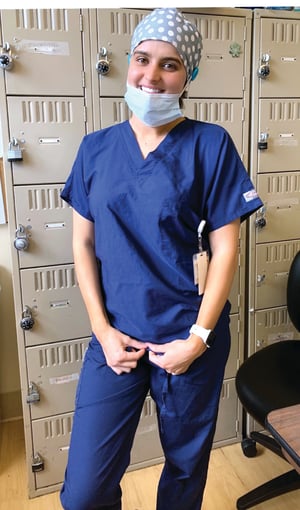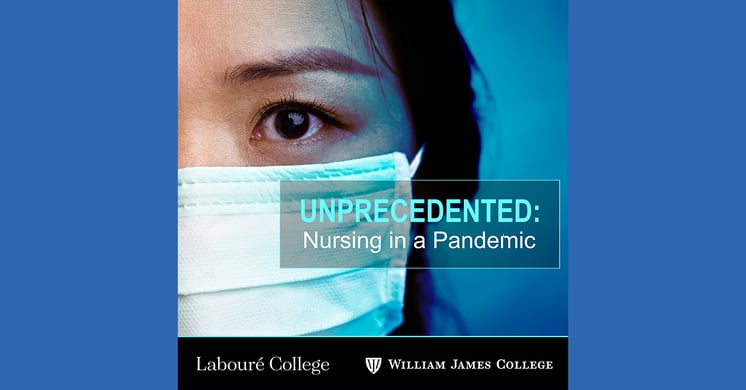Many of our alumni and students are working on the front lines of the COVID-19 pandemic. We spoke to one student, Millena Oliveira '20, who is currently working as a Medical Assistant at Carney Hospital in Dorchester while earning her nursing degree. Read on for what Oliveira had to say about working in the nation's first Dedicated Care Center for COVID-19 patients.
 What has it been like to be working in a COVID-19 dedicated hospital?
What has it been like to be working in a COVID-19 dedicated hospital?
It has been a learning experience that I never would have gotten from school alone. We’re taught about the Ebola outbreak and what that was like, but to actually be in the middle of it and witnessing some really sick people has been extremely educational. I love the emergency department. These nurses dedicate their entire lives to helping people and they’re so consumed by it. The minute you enter the room may be the last time you see them for a couple hours because these COVID patients tend to reach ICU levels of care. So, most of all, I have gained a tremendous amount of respect for these nurses.
Has it reinforced your decision to become a nurse?
Absolutely. When you think about a nurse you think about how passionate they are about others. I feel like this is a prime example of that, of putting aside your wants and your needs and everything that you believe in just to care for these people. In a time like this, a lot of the patients are very alone. We don't allow visitors, unless it’s a specific situation. For the most part, these people are extremely ill and the only person in the room is that nurse that's holding their hand and just letting them know they're not alone. They may be intubated, but we know that they can hear us, and we know that empathy can be so important. It’s that emotional side of it that people don't really see, and you can't really be taught that in school. It’s been amazing to see that firsthand.
Did you feel prepared from your schooling to work in the emergency room?
Yes. The basics of nursing you really grasp from the fundamentals class and forward, and the clinical requirements, like working in a nursing home, are extremely helpful. I had no prior experience, so I would go in and just be really awkward and not know how to approach patients but I was forced to sink or swim. It helped me develop the communication aspect of patient care and I think everything else goes hand-in-hand with that. If I can walk into a room and introduce myself the way we talked about it and the way we do in all our simulations, for example, it makes it a lot easier. I feel like that really prepared me to be better with my patient care.
What support has been helpful to you?
I think the most helpful has just been my co-workers themselves. Even in management, I have a tremendous boss. If there’s something that he or the nurses can see I'm uncomfortable with, they will pull me aside to see if I’m okay or if I need to talk about it. I think the best part is when they’re doing something that they know that I probably haven’t seen before and they pull me in like “This is a learning opportunity; we want you to see this!” That has been awesome to be able to do.
As a student nurse, what have you learned from the patients?
They're all so different. I've definitely learned that when you’re, let’s say, educating them on treatment, it's so different for each patient. Some patients are super willing to learn, and others are extremely stubborn. It’s just about the way that you approach everyone. You have to understand that not everyone is going to be super friendly and excited to be in the hospital. Patients aren't like us in the healthcare industry, where we love being in the hospital for the most part. These people are scared so everything that you do -- the way that you approach them, the way that you teach them -- should help to ease their specific anxiety.
What do you feel is the strongest way that you've grown as a person and as a nurse?
I think patience is definitely something you gain over time. You learn to be more understanding of others. With the pandemic, not knowing what tomorrow will bring, or not knowing if you're going to have the proper PPE (personal protective equipment) the next day, you learn to just like take it day-by-day. That goes for patient care as well. Patients can come in extremely sick, and nurses and doctors might not know what the next step is. You learn to just take a deep breath and remind yourself that there's nothing you can do in the moment other than making sure the patient is safe.
A lot of people assume the emergency room is just chaos, but in reality, it's a very calm environment and it's very methodical. Not everything needs to be done in panic, and sometimes you just have to be a little more patient with the situation and with yourself.
Have you had enough PPE? What do you wear?
We have our N95 masks that we wear now into every room. The entire day, I'm in a face mask. If I'm in the hallway, in the cafeteria, even in the bathroom by myself, I will have a mask on. Going into a room that's a possible COVID-19 patient, we’ll be in a gown, we’ll be in gloves, we’ll have a face shield on, we'll have our N95, and occasionally even a face mask over the N95 mask to protect the integrity of the mask. We tend to use that N95 for the entire day and then it’ll be cleaned. We currently have a system where they'll clean our N95 up two times, and then we throw it out and get a new one.
Visitors at this time are pretty limited, if any. It must be hard to deal with when families visit who really want to come in and see their loved ones. How do you deal with that?
I think this is the saddest part. I come home and that's what I struggle with the most, just seeing really sick individuals being all alone, but the nurses do such an incredible job with updating the families on everything that's going on. There's constant open communication, phone call after phone call. Sometimes a patient's family will be in the waiting room and the nurse will always, always make time to walk out there and talk to them. I think that always keeping them updated with what's going on helps with their anxiety of their loved one being in there by themselves. Just letting families know we care about the patient and they’re not in there alone; we’re in there with them. That nursing part of it is just incredible to watch.
Some nursing students are scared to go back to clinical, and may be questioning this choice of a career as a whole. Do you have any advice for them?
it's funny that you say that, because people are so quick to tell you that this is the career that you chose, but not everyone wants to be on the front lines of something like this. I feel like people are so quick to forget that being a nurse doesn't mean that you can't feel scared. That feeling of fear is completely acceptable and it's completely okay to have. Trust me, there have been so many times that I've come home and just cried, but you just have to remind yourself that right now this is what's going on. If you choose to be there and partake in what's going on, then it's okay to feel scared but you have to remember that today is just another day and you can get through it. It can be really nice when we–me, my co-workers, other student nurses, and my friends–talk about it. Know that it's okay to talk to people because I promise you that you're not the only one that's feeling that way.
Are there any mental health resources at Carney for the nurses?
Yes, actually. We get an email sent to us every day with updates on what's going on and the resources available for the employees. Along with that is an email that you can contact, who can set something up where you can talk to somebody. They're definitely trying to make things available for employees, even childcare, things like that. Because you worry, you know, like who’s going to stay with my kids? I feel like they're really considering all parts of this pandemic
Is there any particular patient that stands out to you the most that you’ve interacted with during this?
Actually, yeah, there's a specific patient. I won't get into much detail, but it was a person who had a lot of family, had children, and ended up being a lot sicker than we hoped for. She was extremely scared, and I sat in that room for a really long time, actually really sitting there, and knew that this is a side that people aren't seeing. We hear how sick these people are, but no one knows how scary it must be for those of them that are laying in a bed, having no one they know around them. That was when I realized how serious it is.
In an emergency room you’re so quick to do everything just to get that person feeling better, but I realized that sometimes we have to take a step back and just approach them as a person who might be terrified right now.
It’s that patient that I still think back to until this day. For every COVID patient, when I walk into the room, they can't see me smiling but hopefully my eyes show it. I just want the patient to know that yes, it’s scary, but there are a bunch of people here who care about them.





Comments